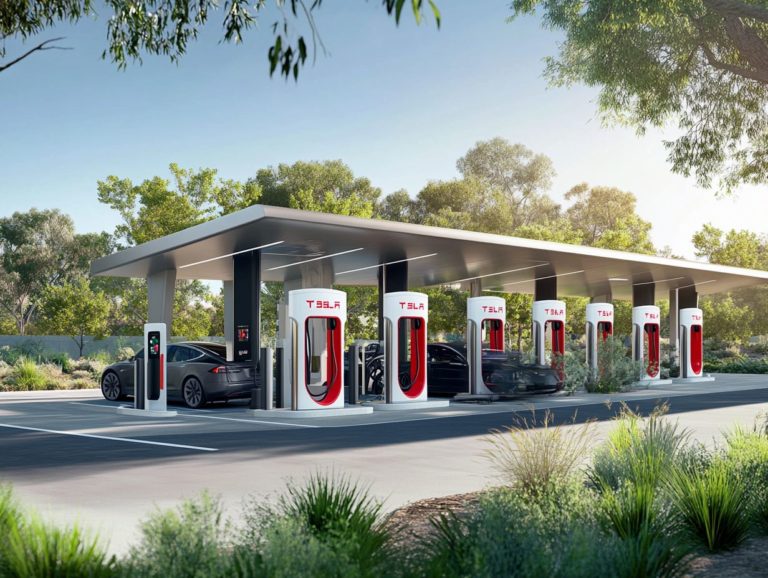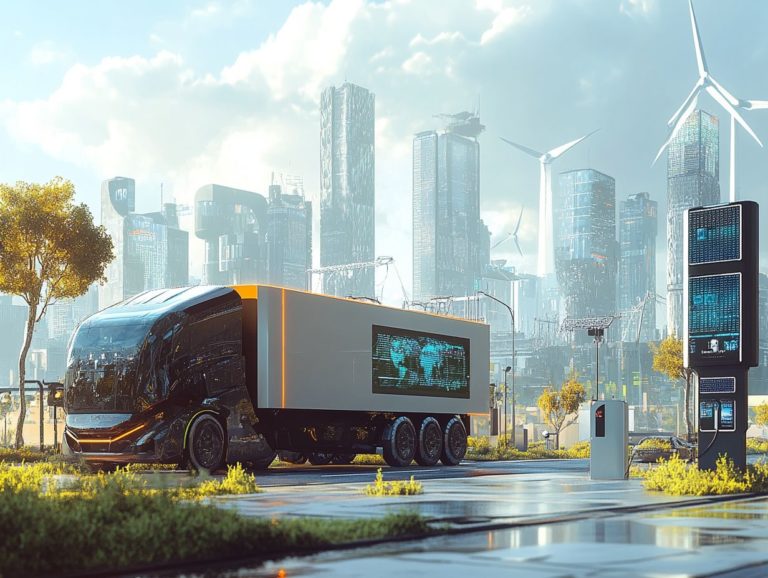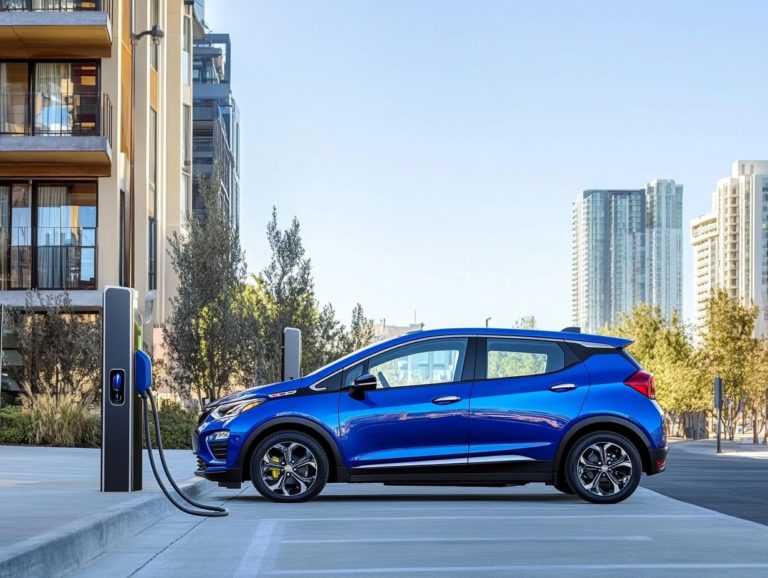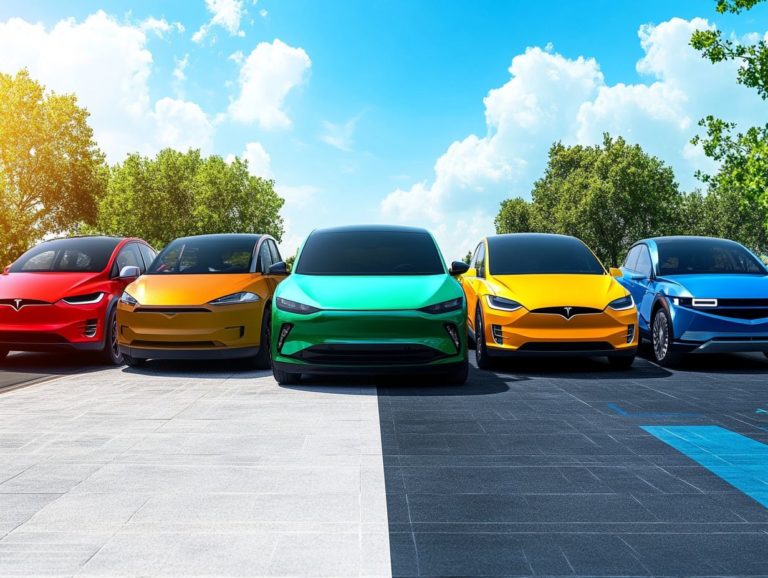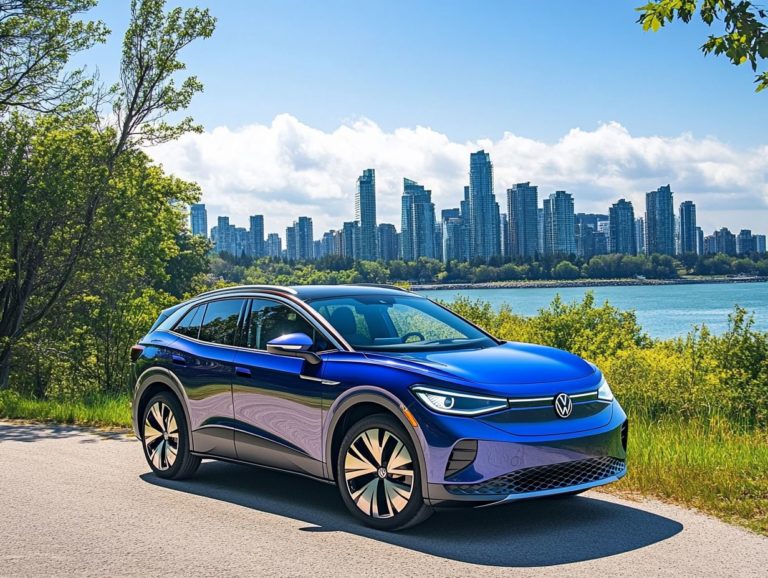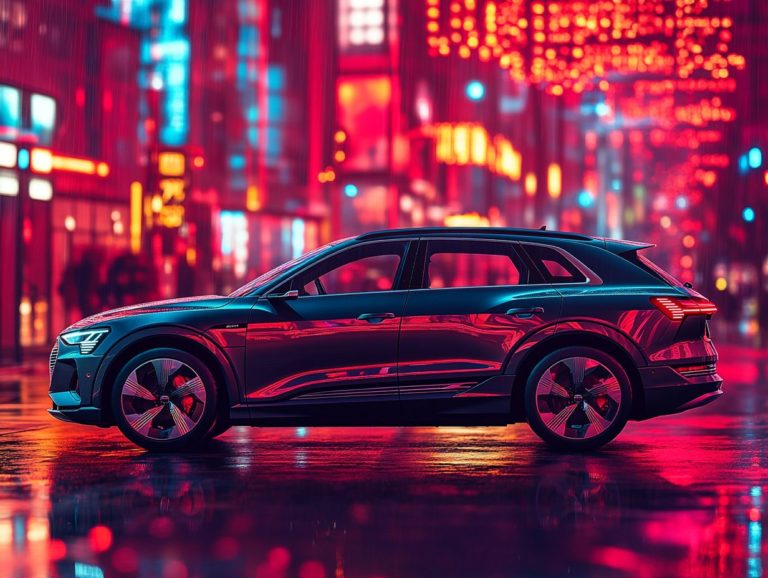Comparing the Charging Speeds of Top EVs
As electric vehicles (EVs) gain traction in the market, understanding EV technology and charging speeds is crucial for potential buyers.
This article delves into the main factors that influence charging times, such as battery capacity and infrastructure. It provides a comparison of charging speeds among leading EV models, showcasing which ones offer the quickest recharge.
This article also examines the latest technology that improves charging efficiency. It offers valuable tips for selecting the right EV that fits your lifestyle.
Dive into this information now to make the best choice for your EV journey!
Contents
- Key Takeaways:
- Factors Affecting EV Charging Speeds
- Top EV Models and Their Charging Speeds
- Improving EV Charging Speeds
- Advancements in Technology and Future Predictions
- Considerations for Choosing an EV Based on Charging Speed
- Frequently Asked Questions
- What are the top EVs with the fastest charging speeds?
- How do the charging speeds of these top EVs compare to traditional gas-powered cars?
- What is the average charging time for these top EVs?
- Do all top EVs use the same type of charging technology?
- What factors affect charging speeds?
- Can I charge my EV at any charging station?
Key Takeaways:
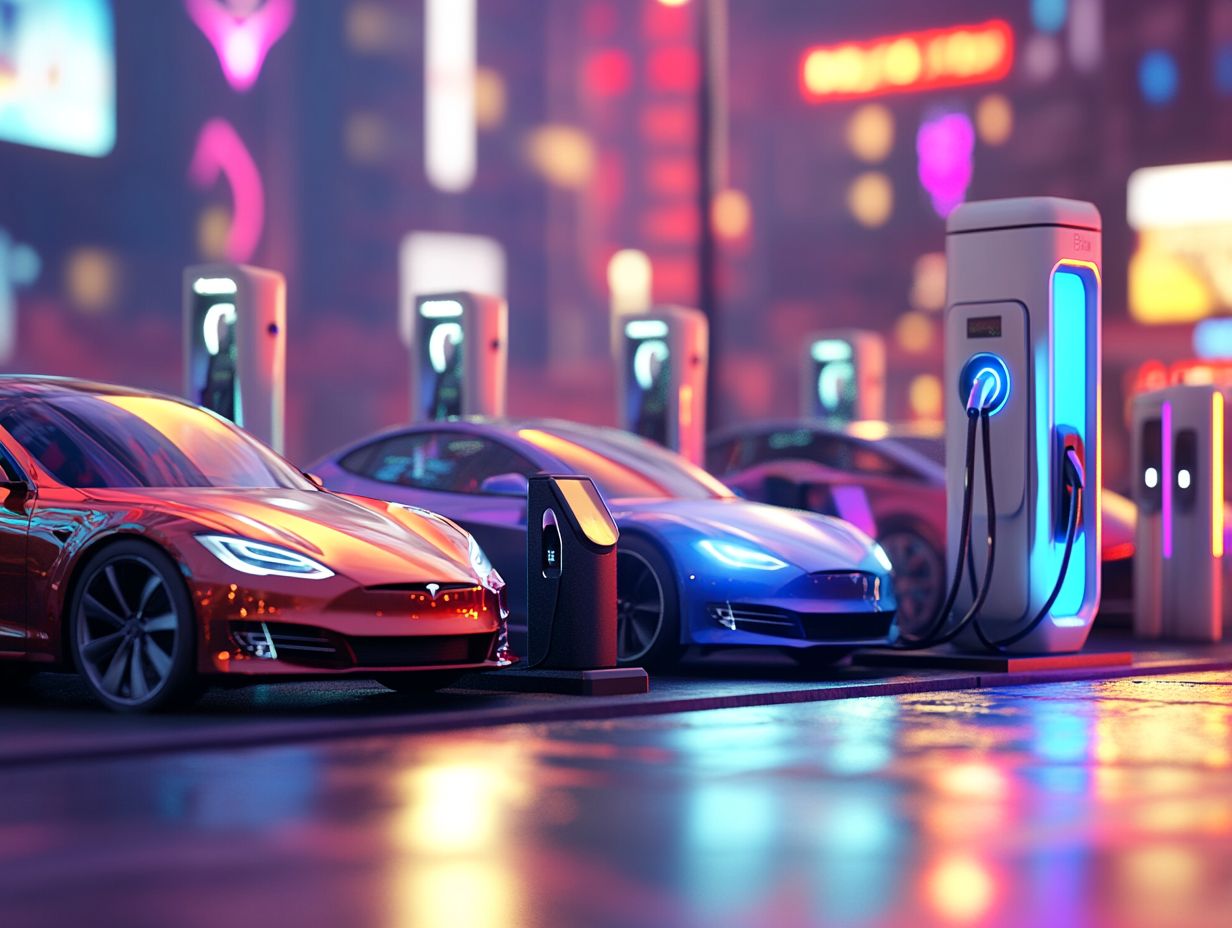
- Charging speed depends on battery capacity and available charging stations.
- When comparing popular EV models, consider their charging times to find the best fit for your lifestyle.
- New technology is consistently enhancing EV charging speeds, making them more convenient for drivers.
Overview of EV Technology and Benefits
Electric vehicles (EVs) are transforming transportation with advanced battery technology and better energy efficiency. They offer numerous benefits compared to traditional gas-powered cars.
Thanks to lithium-ion batteries, which are commonly used in electric vehicles, you can enjoy improved performance and extended driving ranges. These advancements also significantly reduce range anxiety.
With various charging options available like Level 1 and Level 2 charging you ll find suitable charging stations easily through platforms like PlugShare. This makes your transition to electric driving practical and sustainable.
These advancements not only help you achieve a much lower carbon footprint but also provide substantial cost savings. Operating an EV typically means lower maintenance and fuel costs, as electricity is usually cheaper than gasoline.
The rapid growth of charging infrastructure, featuring fast charging stations powered by renewable energy sources, enhances the convenience of electric mobility. This shift benefits individual consumers and promotes a cleaner environment, supporting global efforts to combat climate change.
As more individuals embrace this transformative technology, the broader implications for energy sustainability become increasingly clear.
Factors Affecting EV Charging Speeds
The charging speed of electric vehicles (EVs) depends on several key factors, such as charging infrastructure, battery capacity, and the type of current used.
Understanding these elements is essential for optimizing your charging experience. Energy loss during electricity conversion and the efficiency of onboard chargers play a significant role in how swiftly your EV can recharge.
Fast charging options, like Direct Current (DC) fast charging, allow you to quickly charge your EV, but they require specific charging stations to function effectively.
Battery Capacity and Charging Infrastructure
The battery capacity of an electric vehicle is essential in shaping its performance and charging efficiency. When paired with the right charging infrastructure think both Level 1 and Level 2 options the battery s capacity determines how swiftly and effectively your EV model replenishes its energy.
Understanding the specifications of various models, from the Nissan LEAF to the Chevrolet Bolt, is vital for identifying the most appropriate charging solutions for your needs.
In this rapidly evolving realm of electric mobility, manufacturers are focusing on enhancing battery longevity through advanced energy management systems. These innovations optimize the relationship between battery capacity and charging options, ensuring that regardless of capacity, you experience minimal downtime.
Take Tesla’s Supercharger network, for instance; it perfectly complements its high-capacity battery systems, enabling rapid recharging that meets the demands of long-distance travel.
Therefore, the effectiveness of charging infrastructure significantly impacts the practicality of different EV options, establishing an important link between battery health and charging strategies.
Top EV Models and Their Charging Speeds
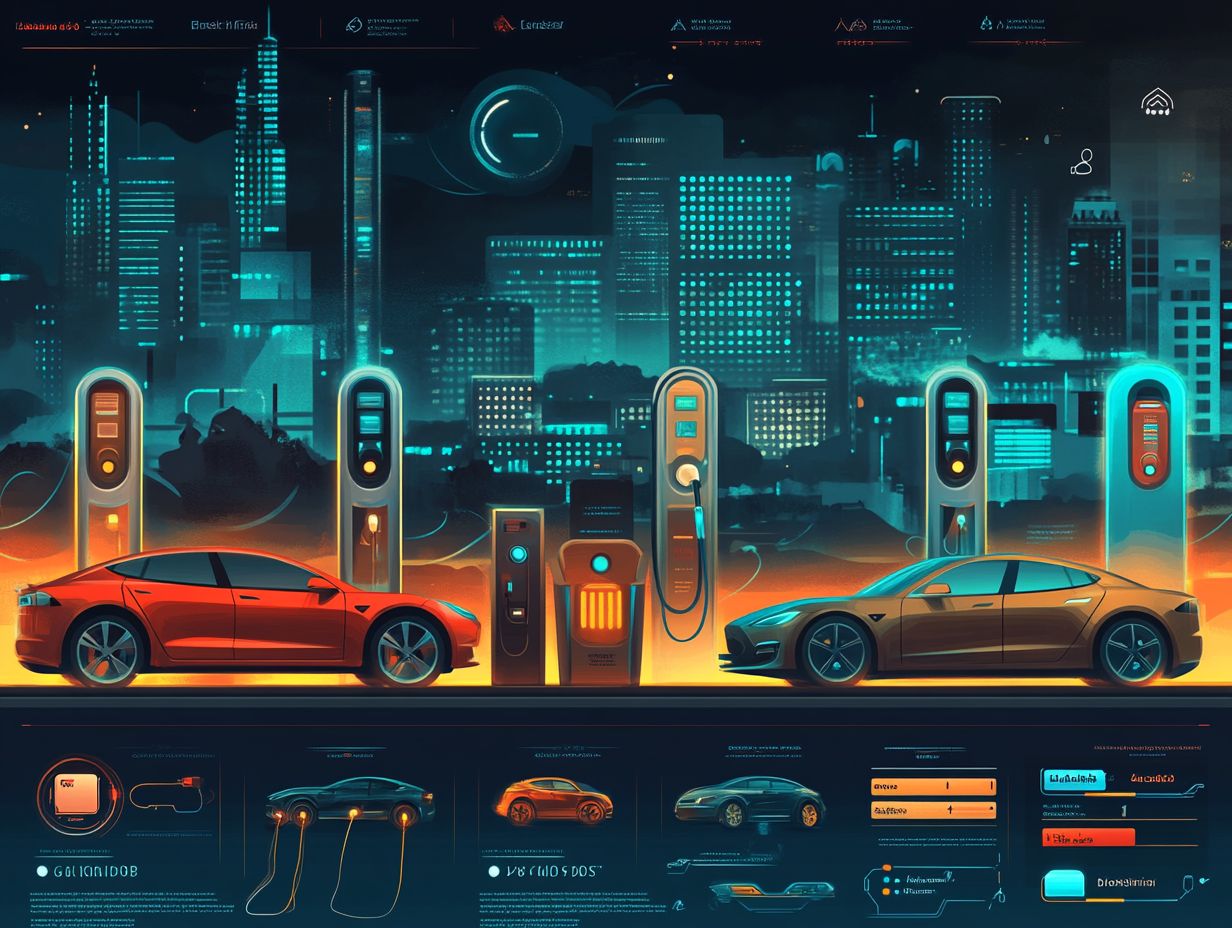
When you’re contemplating the purchase of an electric vehicle (EV), it’s crucial to compare the charging speeds of the leading models on the market. Take a closer look at options like the Nissan LEAF, Chevrolet Bolt, and Hyundai Kona; these vehicles have made remarkable advancements, often boasting impressive charging capabilities. To learn more about the charging speeds and advancements, check out how fast EV chargers really go.
Don’t overlook other strong contenders such as the Tesla Model 3, BMW, and Volkswagen ID.4, which also highlight significant improvements in charging efficiency. Making informed comparisons among these options is essential for any discerning buyer.
Comparison of Charging Times for Popular EVs
When you re evaluating electric vehicles, comparing the charging times of popular models like the Nissan LEAF, Chevrolet Bolt, and Hyundai Kona offers you valuable insights into their real-world usability. By examining how quickly these EVs can recharge with various options, including DC fast charging, you gain a clearer understanding of their driving range and overall performance.
Understanding these comparisons helps ease any worries about running out of charge.
For instance, the LEAF typically provides a 7.2 kW Level 2 charging option, replenishing about 25 miles of range per hour. In contrast, the Bolt boasts an 11 kW capability, offering around 30 miles of range in the same timeframe.
Meanwhile, the Kona impresses with a robust fast-charging system, enabling roughly 80% charge in just 54 minutes using a 100 kW DC fast charger, making it an efficient choice for longer journeys.
By breaking down these specifications and efficiency ratings, you can make informed decisions tailored to your daily commuting habits and charging accessibility.
Improving EV Charging Speeds
Advancements in EV technology are consistently elevating the efficiency and speed of charging, capturing the attention of both manufacturers and consumers.
Battery management systems are progressing, and optimizing charging rates has emerged as a critical focus. This evolution leads to significantly improved DC fast charging (DCFC) speeds.
Such innovations not only minimize downtime for EV users but also enrich the overall driving experience, enhancing both the vehicle’s efficiency rating and its charging capabilities.
Start exploring your electric vehicle options today and enjoy the benefits of quick charging!
Advancements in Technology and Future Predictions
Exciting advancements are on the way that will transform the electric vehicle (EV) charging technology landscape. Expect ongoing innovations that will redefine the EV market.
Innovations in battery technology are paving the way for quicker charging solutions. Smarter charging stations are being developed to optimize energy usage and minimize waste. These breakthroughs improve battery health and charging speeds while contributing to a more sustainable future for electric mobility.
As the demand for electric vehicles continues to rise, the possibilities for wireless charging systems and ultra-fast charging networks are gaining momentum. Integrating renewable energy sources will be vital, allowing you to charge your vehicle with clean energy and shrink your carbon footprint.
The rise of vehicle-to-grid technology means your EV can double as an energy storage unit, enhancing grid stability. With these advancements on the horizon, you can anticipate that EV charging will become more accessible and significantly more efficient. This evolution will encourage greater adoption and fundamentally transform how society views and utilizes electric transportation.
Considerations for Choosing an EV Based on Charging Speed
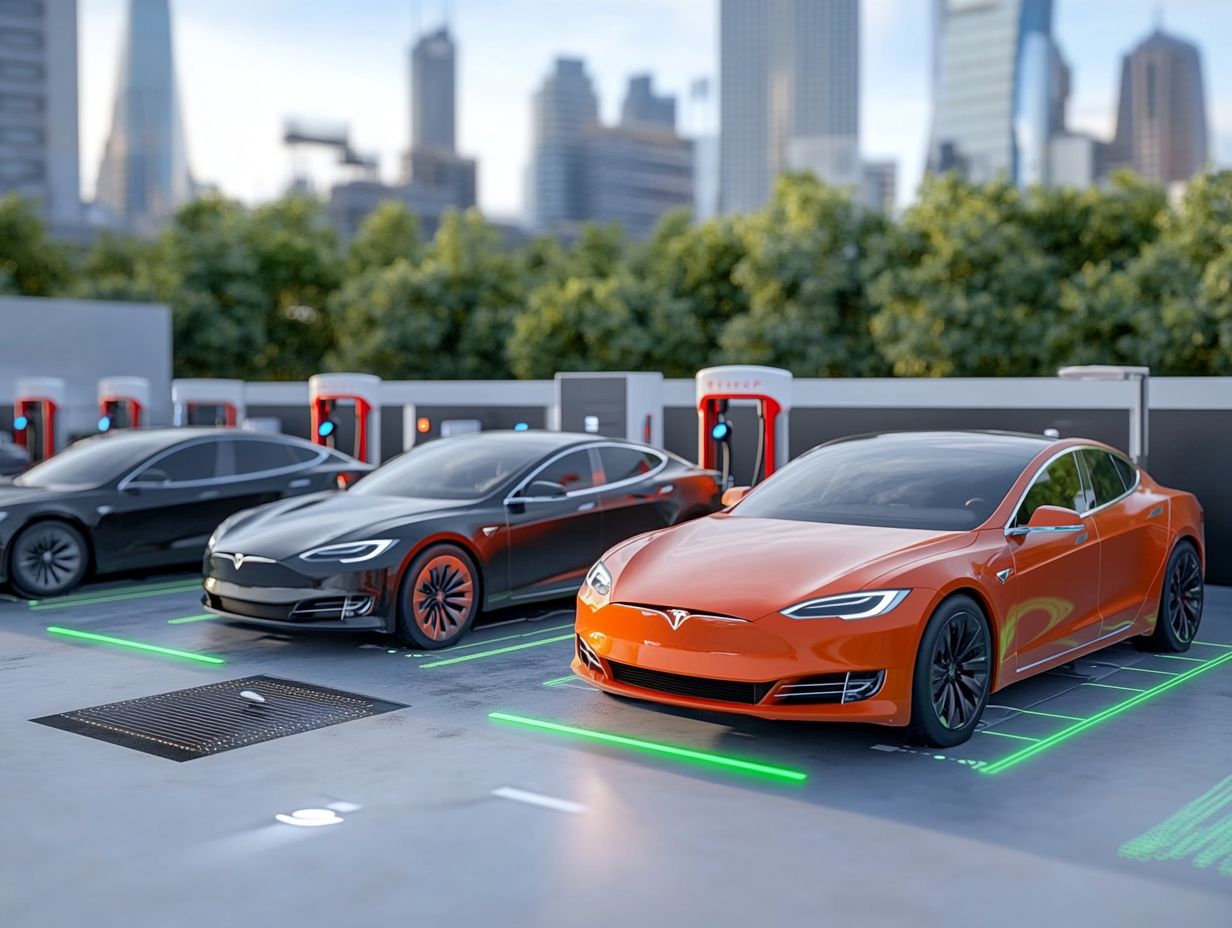
When considering the purchase of an electric vehicle (EV), it s crucial to weigh several factors, especially charging speed and how it aligns with your personal needs and lifestyle.
Assessing available charging options like Level 1 and Level 2 charging can impact the convenience of your EV ownership experience. Level 1 charging uses a standard home outlet, while Level 2 charging requires a dedicated station for faster power. Understanding the connection between battery capacity and charging rates helps improve how you enjoy your vehicle.
Factors to Consider for Personal Needs and Lifestyle
Selecting the right electric vehicle (EV) requires a thorough evaluation of various lifestyle factors, such as daily travel distances and energy efficiency preferences. Grasp how charging speed impacts your overall vehicle usability and assess the driving range of different models, as this knowledge enhances your ownership experience.
Your unique lifestyle dictates what you need from your EV. It s crucial to choose a model that aligns with both your charging capabilities and practical needs.
If you’re an urban commuter, you might prioritize faster charging times due to limited access to charging stations. Conversely, if you frequently go on long road trips, evaluating the available range becomes essential to avoid potential inconveniences.
Energy efficiency plays a significant role, influencing not only your cost of ownership but also contributing to environmental sustainability a growing concern for many.
Conducting a detailed analysis of how these factors interact with your daily routines guides you toward a suitable choice, ensuring that your electric vehicle enhances your lifestyle rather than complicating it.
Frequently Asked Questions
What are the top EVs with the fastest charging speeds?
Looking for the fastest charging EVs? Here are the top options: the Tesla Model S, Porsche Taycan, Chevrolet Bolt EV, Audi e-tron, Hyundai Kona Electric, and Kia Niro EV.
How do the charging speeds of these top EVs compare to traditional gas-powered cars?
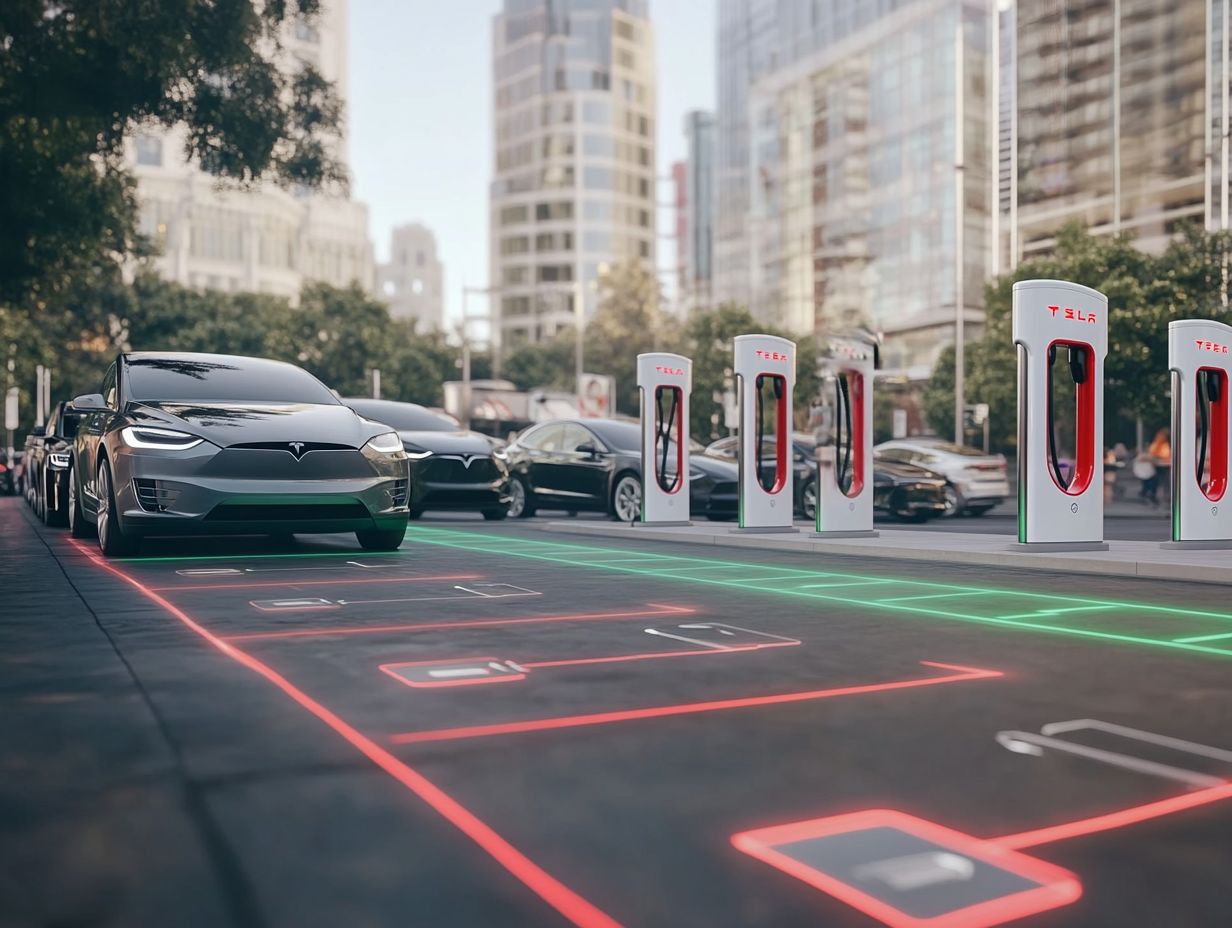
The charging speeds of top EVs are significantly faster than traditional gas-powered cars. While it takes 5-10 minutes to refuel a gas car, EVs can charge up to 80% in as little as 30 minutes.
What is the average charging time for these top EVs?
The average charging time for top EVs is around 30 minutes for an 80% charge. However, this can vary depending on the battery size and the available charging infrastructure.
Do all top EVs use the same type of charging technology?
No, not all top EVs use the same charging technology. Some use quick charging stations, while others rely on standard AC chargers. Always check the charging capabilities before buying an EV!
What factors affect charging speeds?
Several factors influence charging speeds. These include temperature, the battery’s charge level, and the type of charging equipment used.
Can I charge my EV at any charging station?
Check if your EV is compatible with various charging stations. While most top EVs work at public stations, some might need specific adaptors or can only use certain types.

